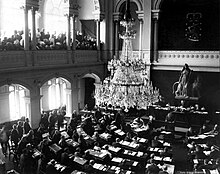 Global Information
Global InformationLiberal democracy information
This article's lead section may be too long. (March 2024) |
| Part of the Politics series |
| Democracy |
|---|
|
|
|

Liberal democracy, Western-style democracy,[1] or substantive democracy[2] is a form of government that combines the organization of a representative democracy with ideas of liberal political philosophy.
Common elements within a liberal democracy are: elections between or among multiple distinct political parties, a separation of powers into different branches of government, the rule of law in everyday life as part of an open society, a market economy with private property, universal suffrage, and the equal protection of human rights, civil rights, civil liberties, and political freedoms for all citizens. Substantive democracy refers to substantive rights and substantive laws with equality of outcome for subgroups in society.[3][4] such as substantive equality.[2]
To define the system in practice, liberal democracies often draw upon a constitution, either codified or uncodified, to delineate the powers of government and enshrine the social contract. The purpose of a constitution is often seen as a limit on the authority of the government. A liberal democracy may take various and mixed constitutional forms: it may be a constitutional monarchy (such as Australia, Belgium, Canada, Japan, Norway, Netherlands, Spain, and the United Kingdom) or a republic (such as France, Germany, India, Ireland, and the United States). It may have a parliamentary system (such as Australia, Canada, Germany, Netherlands, India, Ireland, and the United Kingdom), a presidential system (such as Indonesia and the United States), or a semi-presidential system (such as France).[5] Liberal democracies are contrasted with illiberal democracies and with dictatorships.
Liberal democracy traces its origins—and its name—to the Age of Enlightenment. The conventional views supporting monarchies and aristocracies were challenged at first by a relatively small group of Enlightenment intellectuals, who believed that human affairs should be guided by reason and principles of liberty and equality. They argued that all people are created equal and therefore political authority cannot be justified on the basis of noble blood, a supposed privileged connection to God, or any other characteristic that is alleged to make one person superior to others.
They further argued that governments exist to serve the people—not vice versa—and that laws should apply to those who govern as well as to the governed (a concept known as rule of law). Some of these ideas began to be expressed in England in the 17th century.[6] By the late 18th century, leading philosophers such as John Locke had published works that spread around the European continent and beyond. These ideas and beliefs influenced the American Revolution and the French Revolution. After a period of expansion in the second half of the 20th century, liberal democracy became a prevalent political system in the world.[7]
Liberal democracy emphasizes the separation of powers, an independent judiciary, and a system of checks and balances between branches of government. Multi-party systems with at least two persistent, viable political parties are characteristic of liberal democracies. In Europe, liberal democracies are likely to emphasize the importance of the state being a Rechtsstaat, i.e. a state that follows the principle of rule of law. Governmental authority is legitimately exercised only in accordance with written, publicly disclosed laws adopted and enforced in accordance with established procedure. Some liberal democracies, especially those with large populations, use federalism (also known as vertical separation of powers) in order to prevent abuse and increase public input by dividing governing powers between municipal, provincial and national governments (e.g. Germany, where the federal government assumes the main legislative responsibilities and the federated Länder assume many executive tasks).[citation needed] The characteristics of liberal democracies are correlated with increased political stability,[8] lower corruption,[9] better management of resources,[10] and better health indicators such as life expectancy and infant mortality.[11]
- ^ He, Jiacheng (8 January 2022). "The Patterns of Democracy in Context of Historical Political Science". Chinese Political Science Review. 7 (1). Springer Science and Business Media LLC: 111–139. doi:10.1007/s41111-021-00201-5. ISSN 2365-4244. S2CID 256470545.
- ^ a b Jacobs, Lawrence R.; Shapiro, Robert Y. (1994). "Studying Substantive Democracy". PS: Political Science and Politics. 27 (1): 9–17. doi:10.2307/420450. ISSN 1049-0965. JSTOR 420450. S2CID 153637162.
- ^ Cusack, Simone; Ball, Rachel (July 2009). Eliminating Discrimination and Ensuring Substantive Equality (PDF) (Report). Public Interest Law Clearing House and Human Rights Law Resource Centre Ltd. Archived from the original (PDF) on 6 June 2022.
- ^ "What is substantive equality?". Equal Opportunity Commission, Government of Western Australia. November 2014. Retrieved 28 October 2018.
- ^ Sociology: Understanding and Changing the Social World. 2010.
- ^ Cite error: The named reference
Kopstein2014was invoked but never defined (see the help page). - ^ Anna Lührmann, Seraphine F. Maerz, Sandra Grahn, Nazifa Alizada, Lisa Gastaldi, Sebastian Hellmeier, Garry Hindle and Staffan I. Lindberg. 2020. Autocratization Surges – Resistance Grows. Democracy Report 2020. Varieties of Democracy Institute (V-Dem). [1] Archived 18 December 2021 at the Wayback Machine
- ^ Cite error: The named reference
Carugati2020was invoked but never defined (see the help page). - ^ Cite error: The named reference
Lederman2001was invoked but never defined (see the help page). - ^ Cite error: The named reference
carnegiecouncil1was invoked but never defined (see the help page). - ^ Cite error: The named reference
Franco2004was invoked but never defined (see the help page).